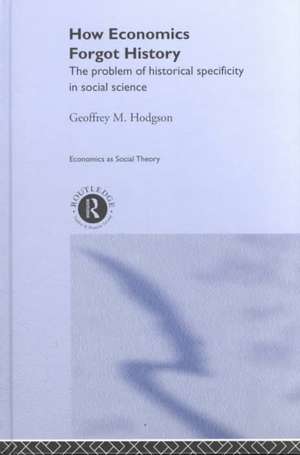How Economics Forgot History: The Problem of Historical Specificity in Social Science: Economics as Social Theory
Autor Geoffrey M Hodgsonen Limba Engleză Hardback – 23 aug 2001
Hodgson argues that the German Historical School was key in laying the foundations for the work of the pioneer institutional economists, who themselves are gaining currency today; and that the growing interest in this school of thought is contributing to a more complete understanding of socio-economic theory.
| Toate formatele și edițiile | Preț | Express |
|---|---|---|
| Paperback (1) | 381.28 lei 6-8 săpt. | |
| Taylor & Francis – 23 aug 2001 | 381.28 lei 6-8 săpt. | |
| Hardback (1) | 1672.42 lei 6-8 săpt. | |
| Taylor & Francis – 23 aug 2001 | 1672.42 lei 6-8 săpt. |
Din seria Economics as Social Theory
- 15%
 Preț: 543.22 lei
Preț: 543.22 lei - 8%
 Preț: 441.23 lei
Preț: 441.23 lei - 15%
 Preț: 492.36 lei
Preț: 492.36 lei -
 Preț: 356.09 lei
Preț: 356.09 lei -
 Preț: 279.86 lei
Preț: 279.86 lei -
 Preț: 428.09 lei
Preț: 428.09 lei - 18%
 Preț: 1436.89 lei
Preț: 1436.89 lei - 15%
 Preț: 420.28 lei
Preț: 420.28 lei - 22%
 Preț: 354.65 lei
Preț: 354.65 lei - 15%
 Preț: 426.70 lei
Preț: 426.70 lei - 15%
 Preț: 470.87 lei
Preț: 470.87 lei -
 Preț: 377.66 lei
Preț: 377.66 lei -
 Preț: 478.03 lei
Preț: 478.03 lei -
 Preț: 417.20 lei
Preț: 417.20 lei - 15%
 Preț: 576.47 lei
Preț: 576.47 lei - 43%
 Preț: 207.05 lei
Preț: 207.05 lei - 26%
 Preț: 766.31 lei
Preț: 766.31 lei -
 Preț: 532.58 lei
Preț: 532.58 lei - 15%
 Preț: 430.45 lei
Preț: 430.45 lei -
 Preț: 295.81 lei
Preț: 295.81 lei - 15%
 Preț: 456.21 lei
Preț: 456.21 lei - 15%
 Preț: 422.26 lei
Preț: 422.26 lei - 15%
 Preț: 458.59 lei
Preț: 458.59 lei - 15%
 Preț: 470.85 lei
Preț: 470.85 lei - 26%
 Preț: 1217.42 lei
Preț: 1217.42 lei - 30%
 Preț: 1017.37 lei
Preț: 1017.37 lei - 15%
 Preț: 515.60 lei
Preț: 515.60 lei - 27%
 Preț: 251.80 lei
Preț: 251.80 lei - 18%
 Preț: 1000.27 lei
Preț: 1000.27 lei - 18%
 Preț: 1282.67 lei
Preț: 1282.67 lei - 15%
 Preț: 463.49 lei
Preț: 463.49 lei - 26%
 Preț: 850.99 lei
Preț: 850.99 lei - 15%
 Preț: 478.96 lei
Preț: 478.96 lei
Preț: 1672.42 lei
Preț vechi: 2039.53 lei
-18% Nou
Puncte Express: 2509
Preț estimativ în valută:
320.01€ • 335.02$ • 264.79£
320.01€ • 335.02$ • 264.79£
Carte tipărită la comandă
Livrare economică 05-19 aprilie
Preluare comenzi: 021 569.72.76
Specificații
ISBN-13: 9780415257169
ISBN-10: 0415257166
Pagini: 446
Dimensiuni: 156 x 234 x 30 mm
Greutate: 0.99 kg
Ediția:1
Editura: Taylor & Francis
Colecția Routledge
Seria Economics as Social Theory
Locul publicării:Oxford, United Kingdom
ISBN-10: 0415257166
Pagini: 446
Dimensiuni: 156 x 234 x 30 mm
Greutate: 0.99 kg
Ediția:1
Editura: Taylor & Francis
Colecția Routledge
Seria Economics as Social Theory
Locul publicării:Oxford, United Kingdom
Public țintă
PostgraduateNotă biografică
Geoffrey M. Hodgson is a Research Professor in Business Studies at the University of Hertfordshire. He has published widely in the academic journals and his previous books include Economics and Utopia (Routledge, 1999)
Recenzii
'I tremendously enjoyed reading this book. Geoffrey Hodgson ... tells a fascinating tale of how economics and social science more generally became abstract and formalistic sciences with little interest in historical and institutional particularities and he develops the beginnings of an account of how the perceived shortcomings may be ameliorated ... Hodgson has done a great job in drawing attention to the fact that economic laws are true only on account of particular arrangements of institutional and cultural facts. He has written an exciting history of how this matter has been treated in the economic literature from Marx to the present day.' - Julian Reiss, Economic History Services
'An outstanding book [which] has both depth and breadth [and] is fun to read, in part because Hodgson is an excellent writer and scholar ... This is a five star text - clearly an excellent choice for individual reading and use in graduate courses in both history of thought and institutional economics.' - Professor Doug Brown (Northern Arizona University, USA), Journal of Economic Issues,
'An important contribution towards understanding the apparent confusion of economic thinking' - Professor Roger Backhouse (University of Birmingham, UK), Journal of the History of Economics
'Hodgson provides us with specific discussions on topics that can otherwise seem discouragingly abstract, and sometimes obscure! His book raises several provocative and important questions which should be recommendation enough to read.' - Dr Cristel De Rouvray (London School of Economics, UK), Business History
'A wonderful work of intellectual retrieval and redemption that brings back to life a now altogether obscure and increasingly forgotten trend in the evolution of the social sciences. Through great erudition, stylistic care and virtuosity, and splendid documentation and notation, Hodgson re-animates the historically grounded argumentation of earlier generations of economists who sought to frame their work less in terms of a general theory of human behavior and more with reference to the significance of historical change and detail.' - Professor Michael Bernstein (University of California, San Diego, USA), Business History Review
'All those who have felt uneasy about the economic-development doctrine that has been laid down over the past fifty years by the high priests of professional economics ... will find solace and vindication in Geoffrey Hodgson's brilliant book.' - Professor George C. Lodge (Harvard Business School, USA), Challenge
'An outstanding book [which] has both depth and breadth [and] is fun to read, in part because Hodgson is an excellent writer and scholar ... This is a five star text - clearly an excellent choice for individual reading and use in graduate courses in both history of thought and institutional economics.' - Professor Doug Brown (Northern Arizona University, USA), Journal of Economic Issues,
'An important contribution towards understanding the apparent confusion of economic thinking' - Professor Roger Backhouse (University of Birmingham, UK), Journal of the History of Economics
'Hodgson provides us with specific discussions on topics that can otherwise seem discouragingly abstract, and sometimes obscure! His book raises several provocative and important questions which should be recommendation enough to read.' - Dr Cristel De Rouvray (London School of Economics, UK), Business History
'A wonderful work of intellectual retrieval and redemption that brings back to life a now altogether obscure and increasingly forgotten trend in the evolution of the social sciences. Through great erudition, stylistic care and virtuosity, and splendid documentation and notation, Hodgson re-animates the historically grounded argumentation of earlier generations of economists who sought to frame their work less in terms of a general theory of human behavior and more with reference to the significance of historical change and detail.' - Professor Michael Bernstein (University of California, San Diego, USA), Business History Review
'All those who have felt uneasy about the economic-development doctrine that has been laid down over the past fifty years by the high priests of professional economics ... will find solace and vindication in Geoffrey Hodgson's brilliant book.' - Professor George C. Lodge (Harvard Business School, USA), Challenge
Cuprins
Part I: Introduction;1: The Limitations of General Theory; 2: The Problem of Historical SpecificityPart II: The Nineteenth Century: The German Historical School and its Impact3: Karl Marx and the Specificity of the Capitalist System: 4: The Older Historical School in Germany; 5: The Historical School in the British Isles; 6: The Methodological Failure of the Older Historical School; 7: Out of Austria: Carl Menger and the Methodenstreit; 8: Alfred Marshall and the British Methodendiskurs; 9: The Responses of the Younger Historical School in GermanyPart III: The Twentieth Century: From American Institutionalism to the End of History10: Thorstein Veblen and the Foundations of Institutionalism; 11: Early American Institutionalism and the Problem of Historical Specificity; 12: The Theoretical Manifesto of John Commons; 13: Talcott Parsons and the Ascent of Ahistorical Sociology; 14: Death and Counter-Revolution at the London School of Economics; 15: John Maynard Keynes and his Declaration of a General Theory; 16: The Triumph of Barren Universality; 17: Institution Blindness and the End of HistoryPart IV: The Millennium: The Second Coming of History?18: Are there Universals in Social and Economic Theory?; 19: Property, Culture, Habits and Institutions; 20: Exchange and Production: Property and Firms; 21: A Note on Social Formations and Levels of Abstraction; 22: An Evolutionary Perspective on the Historical Problem; 23: Invention is Helpless without Tradition
Descriere
Hodgson calls into question the tendency of economic method to explain all economic phenomena using the same catch-all theories. He argues that you need different theories and that historical contexts must be taken into account.





















